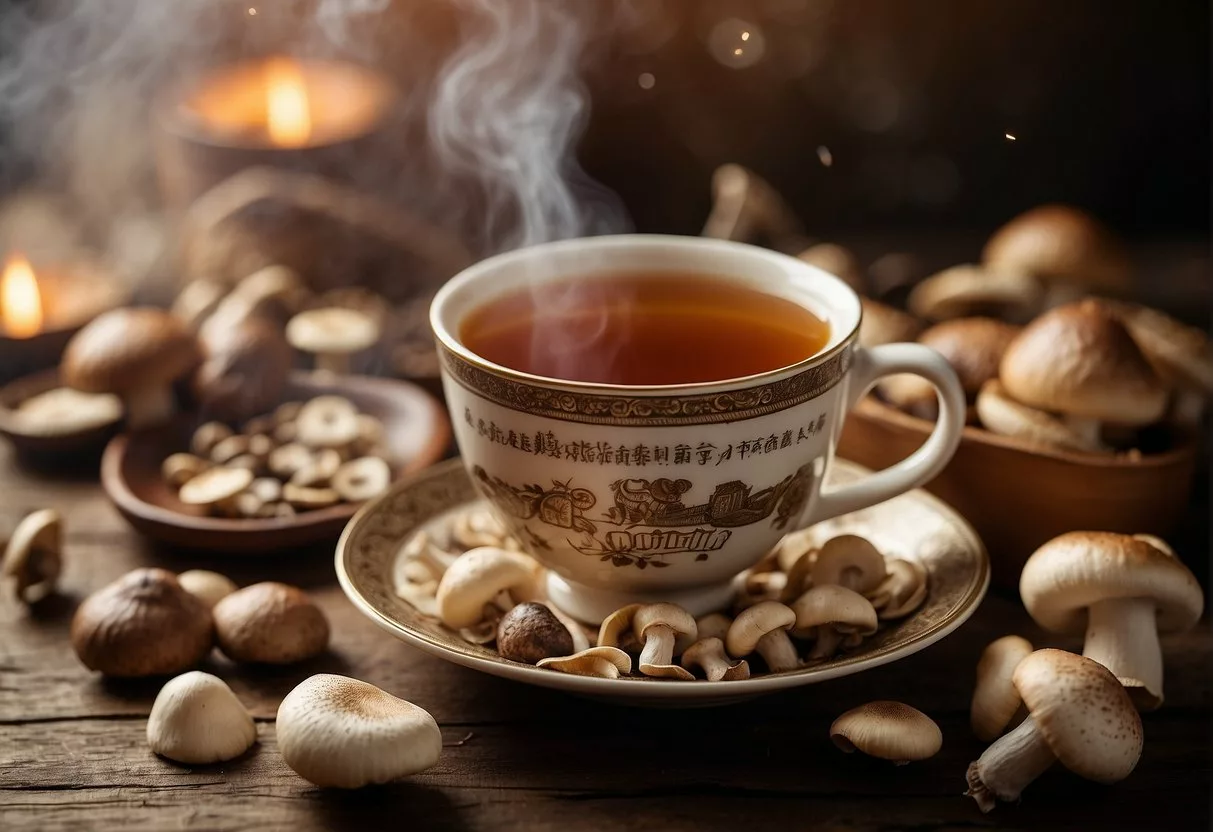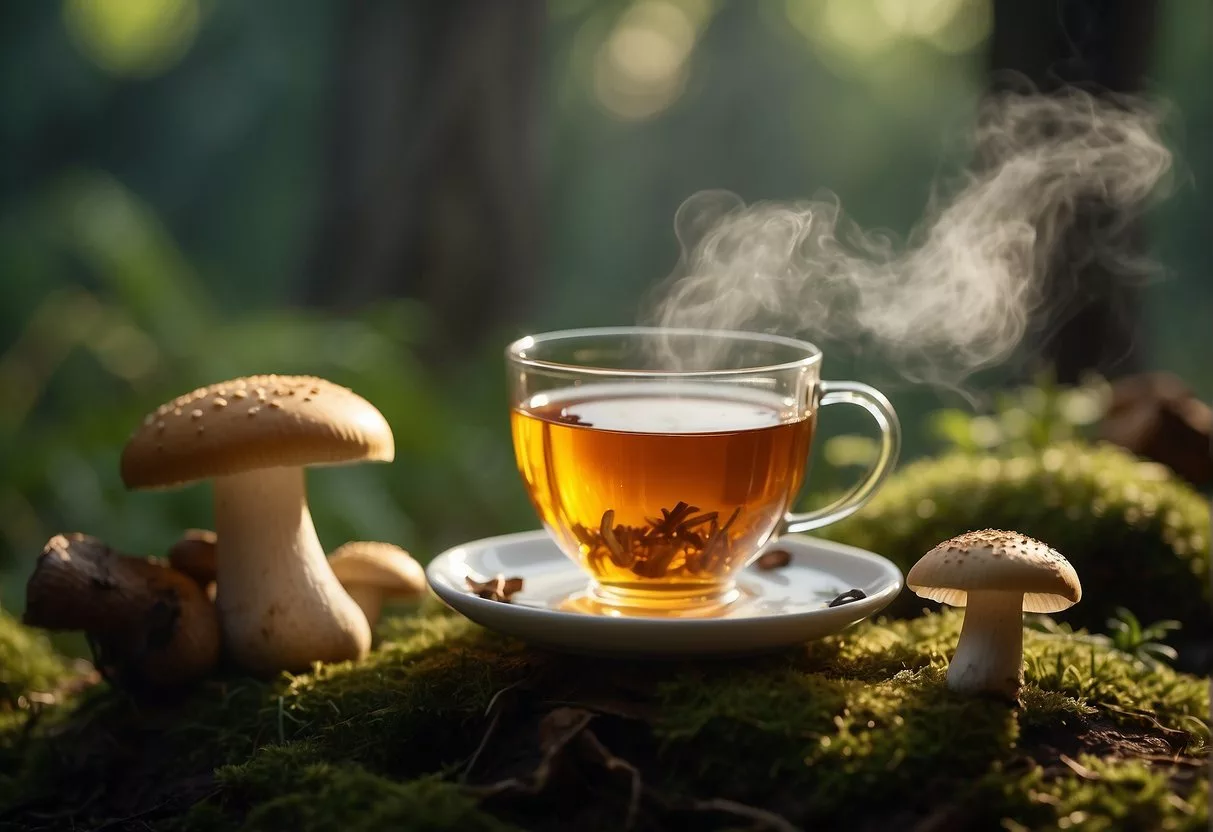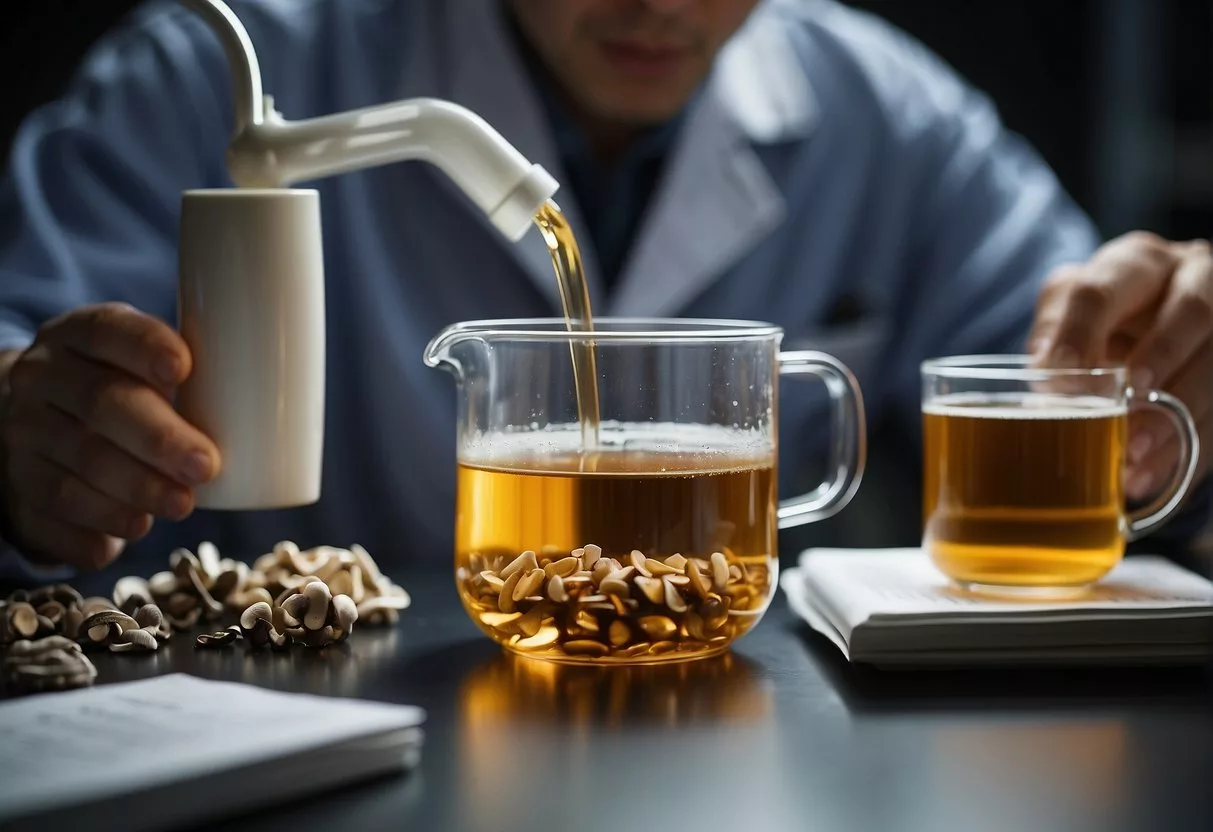Mushroom tea has recently gained popularity as a health supplement. It incorporates the power of fungi like Chaga, reishi, and lion’s mane into a convenient beverage. Touted for its potential health benefits, this tea is believed to offer support for stress management, blood sugar control, and immune system boosting.
The brewing of mushroom tea involves steeping powdered or whole mushrooms. It has become a part of wellness routines for individuals looking to harness the natural compounds found in these fungi.

However, as with any supplement, there are considerations to be aware of, including potential side effects. While mushroom tea is generally considered safe for most people, it’s important to understand the appropriate dosages and possible reactions one may have, especially when combined with certain medications or underlying health conditions.
Consulting with a healthcare provider is advisable before adding mushroom tea to one’s diet, particularly for those with pre-existing medical concerns.
Key Takeaways
- Mushroom tea is praised for various health benefits including stress relief and immune support.
- Potential side effects should be considered and discussed with a healthcare provider.
- Proper preparation and dosage are important to maximize benefits and minimize risks.
What is Mushroom Tea?

Mushroom tea is an infusion made from various types of medicinal mushrooms which have been used for centuries due to their health benefits. Unlike regular tea derived from the Camellia sinensis plant, mushroom tea is prepared by steeping dried mushrooms or mushroom extracts.
Historical Background
Mushroom tea has deep historical roots, particularly in Asian cultures, where it has been consumed for its medicinal properties for thousands of years.
In Siberia, chaga mushrooms, which grow on birch trees, have been used to make tea for centuries. Similarly, other regions in Asia have a rich tradition of consuming reishi, shiitake, and maitake mushrooms in tea form, believing them to support health and longevity.
Types of Mushrooms Used in Teas
Several types of medicinal mushrooms are commonly used to make mushroom tea, each with its own unique properties:
- Chaga (Inonotus obliquus): Often found on birch trees in cold climates, chaga is prized for its antioxidant content.
- Reishi (Ganoderma lucidum): Revered as the “mushroom of immortality,” reishi is believed to support the immune system.
- Cordyceps: This fungus is known for its energizing effects, often compared to the boost provided by caffeine in coffee.
- Shiitake (Lentinula edodes): Apart from its culinary uses, shiitake is consumed in tea form for its beneficial compounds.
- Maitake (Grifola frondosa): Also known as “hen of the woods,” maitake is used for both its flavor and health-promoting properties.
- Turkey Tail (Trametes versicolor): This mushroom contains polysaccharides that may benefit immune health.
These mushrooms are typically dried and steeped to create an herbal tea that lacks caffeine, making it an alternative to traditional coffee or tea for those seeking to reduce their caffeine intake.
Mushroom tea presents a rich, earthy flavor and may be enjoyed solo or blended with other herbs.
Health Benefits of Mushroom Tea

Mushroom tea is gaining popularity due to its numerous health benefits, ranging from boosting the immune system to potentially reducing the risk of cancer. These benefits are primarily attributed to the tea’s content of antioxidants, polysaccharides, and other beneficial compounds.
Boosting the Immune System
Mushroom tea contains compounds that can strengthen the body’s natural defenses. For example, beta-glucans found in mushrooms are known for their immune-boosting properties, which can help fend off pathogens and increase immune health.
Antioxidant Effects
The high levels of antioxidants in mushroom tea assist in neutralizing harmful free radicals. This can help prevent cellular damage and reduce inflammation, which is important for maintaining overall health.
Supporting Heart Health
Certain types of mushroom teas have been found to harbor fibers like beta-glucans, which can bind to cholesterol in the small intestine, aiding in its removal from the body and supporting heart health.
Mental Health and Stress Reduction
Adaptogens in mushrooms like reishi are known to assist with stress reduction. They help the body cope with stress more efficiently, which can contribute to better mental health and quality of life.
Digestive and Gut Health
The fiber in mushroom tea is not only good for the heart but also for the gut. It promotes healthy digestion and contributes to overall digestive health, supporting the growth of beneficial gut microbiota.
Regulating Blood Sugar and Diabetes
Compounds in mushroom tea may have a positive effect on blood sugar levels. Some studies suggest an improvement in glycemic control and a decrease in insulin resistance, which are crucial for managing diabetes.
Potential Anticancer Properties
Research has indicated that some mushrooms contain compounds that might possess anticancer properties. For instance, chaga mushrooms contain antioxidants that may play a role in fighting cancer by preventing the proliferation of cancerous cells and reducing inflammation.
Mushroom Tea as a Dietary Supplement

Mushroom tea is recognized for its potential health benefits, ranging from boosting the immune system to providing a source of antioxidants. This beverage serves as a dietary alternative to traditional teas and coffees, and it could fit into various dietary routines favoring organic and nutritional supplements.
Nutritional Content
Mushroom tea, although not a significant source of dietary fiber, is esteemed for its array of bioactive compounds.
Depending on the type of mushroom used, the tea can be a natural source of vitamin D—especially when mushrooms are exposed to sunlight or UV radiation. This brew also contains antioxidants, which can help mitigate oxidative stress in the body.
Comparing Tea and Coffee
Unlike coffee, mushroom tea typically contains no caffeine, making it an appealing option for individuals looking to reduce their caffeine intake.
Mushroom tea offers a milder flavor profile and can be a suitable replacement for those sensitive to the boldness of coffee or traditional tea. Moreover, it’s often chosen for its calming properties, in contrast to the stimulating effects of caffeine-laced beverages.
Integrating Mushroom Tea into Your Diet
Integrating mushroom tea into one’s diet is straightforward. It can be consumed in place of regular tea or coffee, especially for those seeking beverages with less or no caffeine content.
For a more robust nutritional profile, one might opt for organic mushroom tea varieties.
It’s important to note that while mushroom tea can contribute to the nutritional diversity of one’s diet, it should not be relied upon as the sole source of any specific nutrient.
Side Effects and Safety Concerns

While mushroom tea is generally considered safe for most people, there are potential side effects and important safety considerations that one must be aware of. The following subsections will outline specific adverse reactions, possible interactions with medications, and considerations for some populations who may need to exercise caution.
Potential Adverse Reactions
Consuming mushroom tea may lead to various side effects. For instance, gastrointestinal distress and diarrhea are reported discomforts experienced by some individuals.
In addition, there are instances of allergic reactions to mushroom-based products, which can range from mild to severe. The presence of oxalates in certain mushrooms may also contribute to these side effects.
Everyone’s body reacts differently, and it is crucial to start with a low dosage and monitor one’s response to the tea.
Interactions with Medications
People who are taking prescribed medications should consult their healthcare provider before adding mushroom tea to their diets due to potential drug interactions.
Specifically, ingredients in the tea can have blood-thinning effects and may alter the efficacy of blood thinners. Moreover, some mushrooms have been noted to affect blood sugar levels and cholesterol, which is particularly important for individuals on anti-inflammatory or insulin medications.
Considerations for Special Populations
Certain groups, like those who are pregnant or breastfeeding, should approach mushroom tea with caution.
The impact on these populations is less understood, and the safety profile is not well established. Therefore, it is recommended that they avoid consumption or speak with a healthcare provider prior to use.
Those suffering from conditions such as depression or other mental health disorders should also be cautious, as some mushroom varieties can have various effects on mood and cognitive function.
Scientific Research and Studies

Recent scientific efforts have focused on evaluating the therapeutic potential of medicinal mushrooms, particularly in the form of mushroom tea. Research has explored its various bioactive compounds, assessing their effects on health and disease prevention.
Clinical Trials and Findings
Clinical trials have begun to substantiate the anticancer and anti-inflammatory benefits of medicinal mushrooms.
Compounds such as beta-glucans and triterpenoids, found in certain mushroom species, are being tested for their ability to modulate the immune system and reduce chronic inflammation.
Some mushrooms have been studied for their ability to alleviate oxidative stress, which is associated with many chronic diseases, including cancer.
For example, a study highlighted by National Center for Biotechnology Information (NCBI) indicates that mushrooms are used in clinical trials for their potential to boost cognitive functions and modulate cytokine production, crucial for immune response.
Pharmacological Studies
Beyond clinical trials, pharmacological studies have focused on the isolation and analysis of specific compounds within mushrooms that carry health benefits.
For instance, antioxidant properties of mushroom tea are linked to various health benefits, as antioxidants can neutralize free radicals that contribute to tissue damage and aging.
Research conveyed by NCBI suggests that these properties may also support the gut as a prebiotic, thus positively affecting gut microbiota.
The FDA, responsible for regulating food and medicine, has not yet approved medicinal mushrooms as a treatment for diseases. However, the FDA recognizes the need for more research into the immunomodulatory and immunostimulatory effects of mushrooms on human health.
Preparation and Usage Guidelines

Mushroom tea, a variant of herbal tea, involves precise preparation and adherence to usage guidelines to maximize its potential benefits while mitigating any side effects.
This section provides a walkthrough of brewing techniques, dosage recommendations, and insights into the product’s storage and shelf life.
Brewing Techniques
When preparing mushroom tea, cleanliness and precision are pivotal.
One must ensure the mushrooms, whether chaga mushroom tea or another medicinal variety, are thoroughly cleaned and thinly sliced if fresh.
For dried mushrooms or mushroom powder, accurate measurement according to the recipe is essential.
The standard brewing method involves steeping the mushrooms in hot, but not boiling, water to extract their beneficial compounds without destroying them.
If using powder, one must follow the preparation guidelines which typically call for a specific quantity of powder mixed with hot water.
Optimal Dosage and Frequency
Determining the appropriate dosage is crucial for the safe consumption of mushroom tea.
A low dose may produce mild effects and is often recommended for starters or those with a sensitive stomach, while a high dose may lead to more profound experiences and should be cautiously approached.
Regular consumption guidelines vary, but it’s generally advised to start with small amounts and observe how one’s body reacts before increasing the dose or frequency.
Especially for teas that might contain caffeine or potent medicinal properties, it’s advisable not to exceed the recommended dosing.
Storage and Shelf Life
After brewing, mushroom tea can be stored in the refrigerator for a short period. Typically, it is best consumed within 48 hours to retain its potency and flavor.
For the tea itself or its constituents, such as dried mushrooms or powders, a cool, dark, and dry place is optimal for storage, which can significantly extend their shelf life.
Properly sealed and stored, most mushroom teas can last for several months, but one should always check for signs of spoilage before use.
Frequently Asked Questions

In this section, you’ll find specific information on the health benefits and potential side effects of different types of mushroom teas and supplements, along with guidance on their consumption.
What are the potential health benefits of drinking reishi mushroom tea?
Reishi mushroom tea is lauded for its immune-boosting properties. This tea is also linked to improved sleep and a decrease in fatigue.
Are there any side effects associated with consuming chaga tea?
Chaga tea consumption may cause side effects such as digestive discomfort. People should also be mindful of chaga’s blood-thinning properties.
Can reishi mushroom consumption lead to liver toxicity?
Long-term consumption of reishi mushrooms has been associated with cases of liver toxicity. It’s important to adhere to recommended doses to minimize health risks.
Who may be advised against drinking mushroom tea or taking mushroom supplements?
Pregnant or breastfeeding women, individuals with bleeding disorders, those about to undergo surgery, or those on certain medications should avoid mushroom teas and supplements as they can interact with medications or exacerbate health conditions.
How often is it safe to drink reishi mushroom tea?
Moderation is key for consuming reishi mushroom tea. It is generally safe when taken several times a week, but users should heed manufacturer or healthcare provider recommendations.
What are the general benefits and side effects of using mushroom supplements?
Mushroom supplements can support the immune system. They may also improve cognitive function. However, they can also cause side effects like nausea. Additionally, they may interact with other medications.